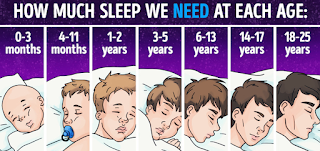A good night's sleep is just as important as regular exercise and healthy eating. In order to preserve our health and promote proper development, the body needs rest, so you have to sleep for a sufficient length of time. Here are the hours of sleep your body needs to maintain good health.
Lack of sleep is a problem
Physical fatigue is not the only thing we can feel when we do not sleep enough. It can also lead to lack of appetite, difficulty in having clear thoughts and decisions, and lack of concentration.
Sleep problems can also cause many health problems. Heart health can be at risk if you sleep less than 5 hours. Diabetes, obesity and weight gain can also be the result of a sleep of less than 7 hours. So you have to think about how many hours of sleep your body needs. Being aware of it is the first step towards better well-being.
The recommended number of hours of sleep
In a series of studies conducted between 2004 and 2014 by Charles Czeisler, professor of sleep medicine at Harvard University, to establish the recommended sleep duration, the results were obtained by evaluating the objectives and discovering how much time was needed to rest so as not to harm health.
According to these results, here are the different stages of development of the human, and the number of hours of sleep recommended according to each age:
- Newborn (0 to 3 months): 14 to 17 hours.
- Babies (4 to 11 months): 12 to 15 hours.
- Children (1 to 2 years): 11 to 14 hours.
- Preschoolers (3 to 5 years old): 10 to 13 hours.
- Children of school age (6 to 13 years): 9 to 11 hours.
- Teenagers (14 to 17 years old): 8 to 10 hours.
- Young adults (18 to 25 years old): 7 to 9 hours.
- Adults (26 to 64 years): 7 to 9 hours.
- Seniors (over 65): 7 to 8 hours.
The number of hours of sleep required for each age is given in hours, because it is difficult to give an exact number of hours, since each person may need a specific number of hours of sleep according to the characteristics of his body. But a shorter number of hours than the one recommended above can lead to health problems.
Sleep problems in many people can be due to several reasons, here are the main ones.
The main reasons for sleep problems
Sleep problems can be due to two main reasons: stress and technology.
Stress: Cortisol, also called "stress hormone", is released when we are in a state of stress. And in case of increased cortisol levels, this can have a significant impact on the feeling of well-being and also harm restorative sleep.
Technology: In order to sleep well, the body releases melatonin. But the brain can not release enough of this hormone in the presence of technological devices emitting light. When the body is in the dark, it can release more melatonin, which is halted in the presence of light televisions, laptops and cell phones.
To remedy sleep problems, it is recommended to change some sleep habits by following some very effective tips.
Increase exposure to bright light during the day
The human body has a natural clock called circadian rhythm. It affects the brain, body and hormones, helps you stay awake and tells your body when to sleep.
Natural sunlight or bright light during the day helps maintain a good circadian rhythm. This improves daytime energy, as well as the quality and duration of nighttime sleep.
Reduce exposure to light in the evening
Exposure to light during the day is beneficial, but exposure to night light has the opposite effect. Again, this is due to its impact on the circadian rhythm, indicating to the brain that it is still daylight. This reduces the secretion of hormones like melatonin, which help to relax and get into a deep sleep.
Do not consume caffeine at the end of the day
Coffee has many benefits and is widely consumed around the world. According to a Canadian study, a single dose of coffee can improve concentration, energy and athletic performance. However, when coffee is consumed late in the day, it stimulates the nervous system and can prevent the body from naturally relaxing at night.
According to a study done by the Wayne State College of Medicine in Detroit, USA, caffeine consumption up to six hours before going to bed dramatically deteriorates the quality of sleep.


